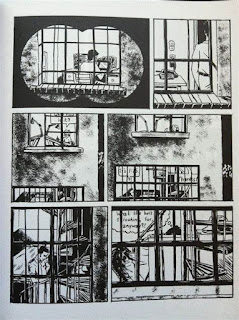Even though our class is technically behind us, you still have two pieces of work due by this weekend (no later than Sunday, the 3rd):
* The Art Exhibit Presentation (see assignment a few posts down)
* The Final Exam Paper (see assignment at the bottom of this post)
Remember that for your Presentation, you can either post a video to Flipgrid or just make a script either as a word document or on a Powerpoint (you can e-mail either of these to me). However, if you want to post on Flipgrid, you MUST make a Flipgrid account so I can add you as a co-pilot to the course (this allows you to post longer videos). So far, no one has done this with their ECU e-mail, so I can't add you to the class. If you did so with another e-mail address, please let me know which address you used (I know one of you is using gmail, and I do have that address). I can help you post the video if you're having trouble, but it's a simple and fun way to do the presentation. However, it's not mandatory.
Please remember to scroll through the blog since it will give you valuable reminders and resources for both assignments. I've included some technical terms, links, as well as summaries of our conversations, which might give you ideas for the paper.
If you have ANY questions, don't hesitate to e-mail me at jgrasso@ecok.edu. But be sure to read both assignments carefully before starting them. I don't want you to miss the boat because you forgot to read the assignment!
Good luck!
Paper #2: Final Exam
For your final exam, I want you to choose one of the following “big” topics and respond to it with at least 2 of the comics from class, as well as at least 2 outside sources. These sources will help you plug into some of the comic book conversations going on outside our class, and help you realize what many scholars and readers think about the subject themselves. Additionally, feel free to use anything from the blog, which has ideas and examples culled from our class discussions and my Powerpoints. This doesn’t count as an outside source, but it might help you discuss some of these ideas and give you more to say/respond to.
Choose ONE of the following topics:
#1: Superhero comics are a powerful way to help younger readers explore issues of identity and morality, and can be even more effective than many forms of traditional literature. Because of this, superhero comics should be an essential part of the middle/high school curriculum alongside works like Shakespeare, Steinbeck, Harper Lee, etc.
#2: Are superhero comics a genre of literature or a form of literature? In other words, are all superhero books more or less alike, following the same conventions, characters, clichés, and storylines? Or are superhero comics merely a framework that various genres can exist within and tell wildly different stories? How can you argue one or another from the works in class?
#3: Some form of comics censorship should exist so readers can find appropriate books and to further remove the inappropriate title of “comics” from superhero books. How would you go about rating some of the books in class, and how can we tell which books are appropriate for which readers? What do terms like “adult content” or even “pornography” mean in relation to comic books?
#4: Superhero comics are still victims of their sexist and racist origins. Despite many attempts to overcome it, we can still see signs of misogyny, racism, and ableism in many of the leading works. Do you think the form, itself, is tainted? Or can it still be overcome?
FINDING SOURCES
·
Remember
to use the ECU library’s website: in the search box on EBSCO Discovery Service,
search for comics and topics related to your topic. You’ll find great academic
articles this way, and there’s been quite a lot written about comics in recent
years.
·
ComicsResearch.org
(a site full of academic and popular content)
·
ComicsResearch.org/blog
(a blog full of comics news and events)
·
Cbldf.org
(Comic Books Legal Defense Fund: a site about banned comics and other
comics-related issues)
·
Lambiek
Comiclopedia (an on-line encyclopedia of comics: http://lambiek.net/artists/index.htm
REQUIREMENTS
·
Quote
from the comics and the articles you use in your research
·
Cite
comics by introducing the comic and cite the author (or artist) at the end
·
Cite
articles by introducing the author & article and citing the page # at the
end, or the journal title
·
Due
on the weekend of January 2-3, or the technical end of Intercession

























.jpg)